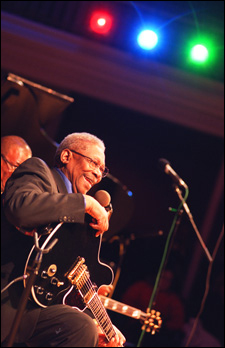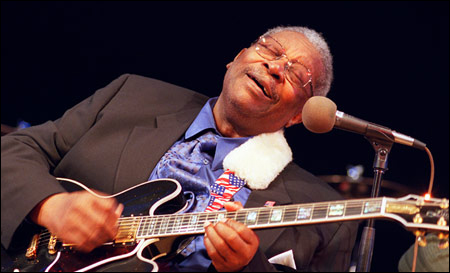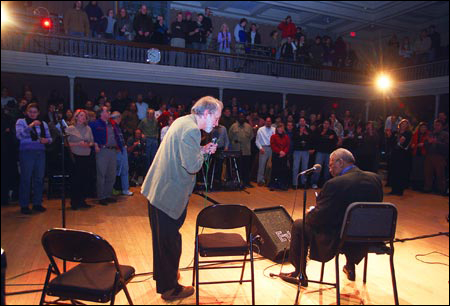Crimson turns blue
The thrill is not gone as B.B. King visits Extension School class

It’s not every Harvard class that opens with a standing ovation.
But then, most Harvard classes aren’t launched with the introduction, “The king of the blues, B.B. King!”
That’s how the septuagenarian blues legend-turned-professor took the stage Tuesday night (Jan. 6) for an intimate discussion and performance for the members of the Harvard Extension School class “History of Urban Blues.” More than 100 invited guests, local musicians, and others who learned through the grapevine of King’s unpublicized appearance joined the 44 class members for a two-hour lesson in the blues in Lowell Hall.
Warm, generous, and brimming over with stories from his half-century career, King brought alive the musicology, psychology, and cultural history of the blues – from the familiar 12-bar structure to discrimination in the segregated South – with words and music.
“Blues to me is life as we are living it today and as I believe we will be living it tomorrow and as I know we were living it in the past,” said King. “It’s what you feel, what comes in your mind.”
‘Each note is precious’
Backed by the rhythm section of his band, with his famous guitar Lucille resting on his large lap, the 78-year-old native of a Mississippi plantation delivered blues lessons that transcend any textbook, CD, or concert. He opened with a powerful demonstration of the personal imprint he stamps on the standard 12-bar blues, first playing a slow blues in B-flat “the way that most people would.”

Competent and lyrical, it stood solidly as great music – until King toppled it with the same progression, B.B. King style. Lucille sang out in his masterful hands, as King imbued each note with powerful expression. He seemed transported, glancing heavenward then focusing straight at the audience as he played.
Reminding the audience of the fable of the fox and sour grapes, he described his style as compensating for his surprising shortcomings as a guitarist. “I can’t play a lot of fast notes, but the ones I do try to play, I try to make a lot of sense of it,” he said. “To me, each note is precious.”
He repeatedly amused his listeners with self-deprecating commentary on his lack of technical prowess.
“There are a lot of positions they didn’t put on my guitar,” he joked, showing how he played several keys with one hand position. “I don’t know why they put them on other people’s guitars.” He explained that the signature trill of his
Visit the Web site for the Harvard Extension School’s ‘History of Urban Blues’ class
left hand on the fret board also arose as a compensatory technique. When he was first learning to play, he said, he was captivated by the sound of Hawaiian and country steel guitars but could never master a slide. He developed the trill to approximate its wavering sound.
“You do what you do the best you can do it,” he said, distilling the musical mantra that has guided his career. “You try to do the best you can do sounding like you.”
Closing his “set” with an audience request, Sonny Boy Williamson’s “Eyesight to the Blind,” and his mammoth crossover hit “The Thrill Is Gone,” King and his band were joined by “Urban Blues” professor and King biographer Charles Sawyer on harmonica. “This is a treat, because we don’t often get a chance to get such a great educator to come up and play the blues,” said King, clearly honored by his temporary appointment as Harvard professor.
Preaching the gospel of the blues
King’s Harvard appearance was the product of “some real persistence, and B.B.’s generosity, and a friendship of 35 years,” says Sawyer, who first met the bluesman in a Peabody club in 1968. When Sawyer’s “Urban Blues” class was added to the Extension School curriculum this fall, King agreed with enthusiasm to visit the class. The bluesman, who until recently played 240 gigs per year, happened to have a night off at the beginning of a brief New England tour.
King is by no means the only “guest lecturer” in Sawyer’s course this semester. Blues musicians from the region and beyond, including guitarist Debbie Davies, guitar-and-harmonica duo Paul Rishell and Annie Raines, and pianists Mark Naftalin and David Maxwell have played for the class; and Rounder Records producer Scott Billington and music journalist Peter Guralnick have shared their insights on blues and the music industry with students.
“The added value is enormous, and I really couldn’t have quite anticipated it until I saw it,” says Sawyer of the guest visits. Maxwell, for instance, answered a student’s question about the difference between jazz and blues at the piano, demonstrating the sonic structures that distinguish the two related forms. Davies, who toured with the late Texas bluesman Albert Collins, treated students to a glimpse of life on the road, from rehearsals (there were none) to pulling into gigs 10 minutes before showtime.

“You don’t get that in a nightclub. You don’t get that in a textbook,” says Sawyer. “I’ve learned an enormous amount, even though I’ve studied this music all my life.”
For Extension School student Baron Hanson, a self-described “white kid from the suburbs” with no previous knowledge of the blues, the course and its roster of guests has provided a rich musical and cultural experience. “It’s been unbelievable,” he said of the guests who “come running” when Sawyer calls. “To hear what they have to say, to be able to ask them questions, has been terrific.”
Beyond musical history, Sawyer, who has taught computer science courses for the Extension School since 1991, uses the Harvard bully pulpit of “Urban Blues” to spread what he calls “the Gospel of Charlie.”
“The general message is that our popular culture has been infused with the blues,” Sawyer preaches. “Its presence in our music is pervasive and it’s fundamental and it’s so familiar you may not even notice it.”
In words and music, King echoed Sawyer’s sermon. Blues, he said, has long been at the bottom of the musical totem pole. “It was almost like being black twice,” said King of his early days playing blues in the Mississippi delta.
“But I’ve tried to show people that the music we play is a part of America’s music. We didn’t borrow it from nobody else,” said the master. “You can dance on it, you can cry over it, you can grieve on it, you can be happy on it. I finally got to the place where I’m proud of what I do.”




